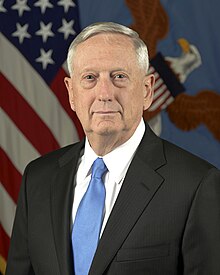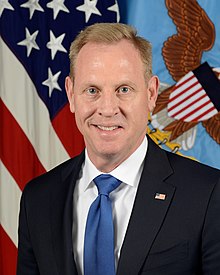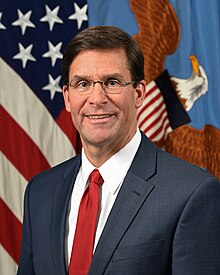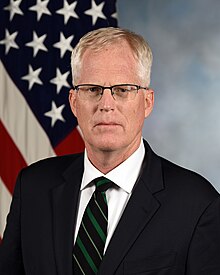Woke Generals
VoteVets Explains How Project 2025 Would Affect the Military and Veterans.
Trump Dodged the Draft 5 Times
Former Trump lawyer Michael Cohen disclosed that Trump fabricated an injury, claiming to have bone spurs, to dodge military service during the Vietnam War. Importantly, there are no medical or surgical records to corroborate this injury. This came after Trump had already managed to avoid service on four previous occasions while continuing his education. Additionally, it has been reported that Trump's father had connections with the doctor who provided this dubious diagnosis, raising further questions about the legitimacy of Trump's claims.
Trump had FOUR Secretaries of Defense under him during his first presidency.
Jim Mattis

January 20, 2017 – January 1, 2019
Patrick Shanahan (acting)

January 1, 2019 – June 23, 2019
Mark Esper

July 23, 2019 – November 9, 2020
Christopher C. Miller

November 9, 2020 – January 20, 2021
Jim Mattis
Patrick Shanahan
Mark Esper
Fired by Trump
On November 9, 2020, just days after his election loss, Trump tweeted that Mark Esper was "terminated" and announced that Christopher C. Miller, the director of the National Counterterrorism Center, would serve as Acting Secretary of Defense. Notably, Esper had submitted his resignation letter four days prior, before a winner had been declared.
Esper, along with all living former secretaries of defense, published an op-ed in the Washington Post condemning Trump's attempts to overturn the election results.
On January 2, 2021, shortly before the end of Trump’s term and the inauguration of Biden, Esper, along with all living former secretaries of defense, published an op-ed in the Washington Post condemning Trump’s attempts to overturn the election results. They asserted that the military had no role in changing the outcome. This statement came shortly after discussions by Trump ally Michael Flynn and reportedly Trump himself about the possibility of declaring martial law to maintain power. The group emphasized, "Our elections have occurred. Recounts and audits have been conducted. Appropriate challenges have been addressed by the courts. Governors have certified the results. And the electoral college has voted. The time for questioning the results has passed; the time for the formal counting of the electoral college votes, as prescribed in the Constitution and statute, has arrived."
Major Disagreements with Trump:
Esper supported renaming the military bases named after Confederate generals, Trump did not.
Esper believed diversity and inclusion was important in the military, Trump did not.
Trump supported invoking the Insurrection Act of 1807 to deploy troops to American cities during the George Floyd Protests. Esper did not.
Trump withdrew US Troops out of Germany without consulting them or other NATO allies. Esper thought that was a bad idea.
Esper didn't believe that putting a timeline on Afghanistan withdrawal was a good idea, since it was based on conditions. TRUMP WITHDREW THEM ANYWAYS to try to win the 2020 election.
Christopher Miller, author of Project 2025's Department of Defense Section, and His Role in January 6
Christopher Miller authored the Department of Defense section of Project 2025.
January 6 Controversy
Miller's actions on January 6 came under intense scrutiny. After rioters breached the Capitol Police perimeter, he took more than three hours to authorize the deployment of the National Guard, waiting until 4:32 PM to give permission. By that time, National Guard assets from Virginia had already entered the District, and Trump had instructed the rioters to "go home." In his testimony, Miller explained that he was trying to prevent a situation similar to the Kent State shootings.
In the video, Miller LIES ON FOX NEWS compared to what he said Under Oath!
Trump mocked John McCain for being captured
Trump's mockery of John McCain for being captured during the Vietnam War became a significant point of controversy during the 2016 presidential campaign. In a 2015 interview, Trump dismissed McCain's status as a war hero, saying, "I like people who weren't captured." This remark was widely condemned, as it not only belittled McCain's military service but also disrespected veterans and those who had endured captivity.
McCain, who spent over five years as a prisoner of war, had long been revered for his sacrifice and resilience. Trump's comments sparked backlash from veterans, political figures, and the public, highlighting a broader tension between Trump's rhetoric and traditional Republican values regarding military service. The incident underscored Trump's tendency to prioritize personal loyalty and bravado over established norms of respect for service members.
Suckers and Losers
Suckers
It's filled with Losers
Trump's Staff and the Altercation with an Arlington National Cemetery Official
Controversy has arisen following former President Donald Trump’s visit to Arlington National Cemetery, sparked by reports of a confrontation between Trump's campaign staff and a cemetery official. The official reportedly attempted to prevent photography in Section 60, where such activities are restricted.
Trump visited the cemetery to honor the 13 U.S. troops who lost their lives in the Abbey Gate attacks during the U.S. withdrawal from Afghanistan in August 2021.
According to USA TODAY, a member of Trump's team forcefully bypassed the official in Section 60, allowing photography to take place. Subsequently, images of Trump, family members of fallen soldiers, and others at military gravesites circulated on social media.
Trump received a PURPLE HEART (After dodging the draft five times) from a war veteran who thought he deserved it for taking a bullet in Butler PA
Donald Trump received a Purple Heart medal from a Vietnam War veteran during a campaign event on Friday, despite his history of avoiding military service.
The GOP presidential candidate accepted the medal from a veteran named Dwight, who presented it to him following an assassination attempt in Butler, Pennsylvania, on July 13. Many have criticized Trump for accepting the medal, calling it “disgusting” and “disrespectful.”
During their meeting at a town hall event in Fayetteville, North Carolina, Congresswoman Anna Paulina Luna read a heartfelt letter from Dwight. In the letter, Dwight expressed his admiration for Trump’s resilience during the Butler rally, saying, “My wife and I both thought it appropriate” to give him the Purple Heart as a small token from his time as a young Marine in Vietnam.
Project 2025 would slash veterans benefits, especially if "they were not directly caused by service"
Removal of Troops from Afghanastan - TRUMP NEGOTIATED WITH THE TALIBAN INSTEAD OF THE AFGHAN GOVERNMENT - and then took credit for the removal after botching it, and then said that "WOKE GENERALS" weren't real generals.
Timer on Troop Withdrawal
In February 2020, the Trump administration and the Taliban signed the United States-Taliban deal in Doha, Qatar, which stipulated fighting restrictions for both the US and the Taliban, and in return for the Taliban's counter-terrorism commitments, provided for the withdrawal of all NATO forces from Afghanistan by 1 May 2021
Negotiating with Terrorists
This deal did not involve the then Afghan government, and was one of the critical events that caused the collapse of the Afghan National Defense and Security Forces (ANDSF) and the Taliban takeover of Kabul
In the aftermath of the agreement, the US stopped supporting the Afghan military in its offensive operations, forcing it to take mostly defensive positions around the country.
Propaganda and Restrictions
According to the agreement, US military aircraft could not attack Taliban groups waiting more than 500 meters away, giving the Taliban an edge in targeting Afghan military units. The agreement also exacerbated the decline in morale of the Afghan army and police, making them more open to accepting bargains with the Taliban. Due to a lack of information and secret annexes in the agreement, that had not been shared even with the then Afghan government, the Taliban were able to spread propaganda and disinformation about the agreement, including convincing local police and military units that the US had handed over territories to the Taliban and that they should abandon their positions.
Trump's Withdrawal Attempt
Biden Finished the Job
On July 8, 2021, President Biden announced that the official end of the war in Afghanistan would take place on August 31, 2021. He defended the decision to withdraw U.S. troops, asserting confidence in the Afghan military’s capabilities, claiming they were "better trained, better equipped, and more competent in conducting war." However, the Afghan army was quickly overwhelmed by the Taliban's rapid advance, losing control of 139 districts by July 12, 2021. A U.S. intelligence report predicted that the Afghan government would likely collapse within six months following the withdrawal, but later assessments from the U.S. military indicated that this collapse would happen much sooner.
Trump took credit for Biden's withdrawal of US troops and mocked "woke generals".
Trump wanted to weaponize the military against Black Lives Matter Protestors, according to his former Secretary of Defense, Mark Esper
Former Defense Secretary Mark T. Esper revealed in an interview with NPR's Michel Martin that President Donald Trump once asked about the possibility of shooting protesters during the unrest following George Floyd's murder in 2020. Esper detailed this incident, among others, as part of a broader discussion about his time in the administration. He expressed concern that if he had left, Trump would more readily pursue his "dangerous ideas."
Esper also shared his hope that Trump does not run for president in 2024, stating, "We need leaders of integrity and character, leaders who will unite people and work across party lines for the good of the country. Donald Trump doesn’t meet that standard for me on any of those fronts." He described how he and other officials were caught off guard by Trump's intense reaction to the protests, noting that the president felt they portrayed the country as weak and wanted to take action.
Recalling a particularly alarming moment, Esper said, "The president was enraged. He turned to [Joint Chiefs of Staff] Gen. [Mark] Milley and asked, 'Can't you just shoot them, just shoot them in the legs or something?' It was both a suggestion and a formal question that left us all stunned." In his new memoir, *A Sacred Oath: Memoirs of a Secretary of Defense During Extraordinary Times*, Esper portrays Trump as a volatile and ill-informed leader fixated on power and self-image.
JD Vance voted against access to care for rural veterans, assistance for homeless veterans, healthcare for women veterans, support for veteran caregivers, and childcare for vets with kids
TO BE CLEAR - JD Vance voted AGAINST services for 9.1 MILLION Veterans:
— VoteVets (@votevets) August 9, 2024
➡️Access to care for rural Veterans
➡️Assistance for homeless Veterans
➡️Healthcare for Women Veterans
➡️Support for Veteran caregivers
➡️Childcare for Vets with kids
